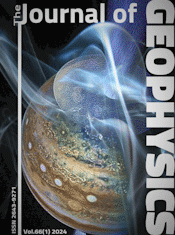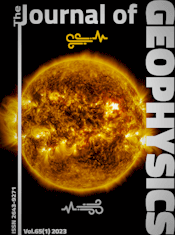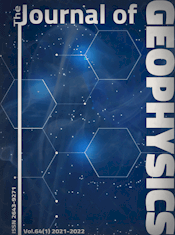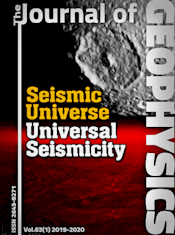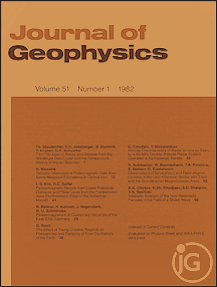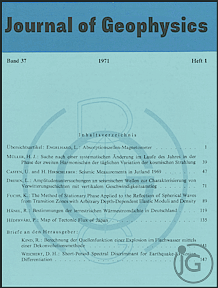Evaluation of the effectiveness of theoretical model calculation in determining the plasmapause structure
Article Sidebar
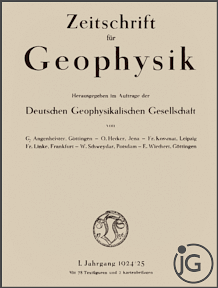
Vols. 1-18 (1924-1944), ISSN 0044-2801
Main Article Content
Abstract
The relative position of the VLF/ELF emission region with respect to the plasmapause is of essential importance in studying their generation and propagation mechanism. On occasions when whistler data are not available, providing extensively the experimental determination of the plasmapause, we are obliged to rely on the theoretical model calculation or, alternatively, on the empirical formulas. The present paper deals with the evaluation of the effectiveness of the use of a theoretical model calculation in estimating the plasmapause location with reference to its comparison with in-situ electron density measurements and empirical formulas, during a specific geomagnetic storm. It is concluded that the temporal evolution with the present theoretical calculation, under a more acceptable convection electric field model, would yield a sufficiently reliable value for the plasmapause configuration rather than the empirical formulas. It can be used in the study of wave-particle interactions when whistler data are not available and also in the study of the erosion of the plasmasphere itself.
 ARK: https://n2t.net/ark:/88439/y088608
ARK: https://n2t.net/ark:/88439/y088608
Permalink: https://geophysicsjournal.com/article/238
Article Details
References
Carpenter, D.L., Park, C.G. (1973) On what ionospheric workers should know about the plasmapause-plasmasphere? Rev. Geophys. Space Phys. 11:133-154
Chappell, C.R. (1972) Recent satellite measurements of the morphology and dynamics of the plasmasphere. Rev. Geophys. Space Phys. 10:951-979
Chen, A.J., Wolf, R.A. (1972) Effects on the plasmasphere of a timevarying convection electric field. Planet. Space Sci. 20:483-509
Corcuff, Y. (1975) Probing the plasmapause by whistlers. Ann Geophys. 31:53-68
Ejiri, M. (1978) Trajectory traces of charged particles in the magnetosphere. J. Geophys. Res. 83:4798-4810
Ejiri, M., Hoffman, R.A., Smith, P.H. (1978) The convection electric field model based on Explorer 45 observations. J. Geophys. Res. 83:4811-4815
Foster, J.C., Rosenberg, T.J., Lanzerotti, L.J. (1976) Magnetospheric conditions at the time of enhanced wave-particle interactions near the plasmapause. J. Geophys. Res. 81:2175-2182
Gendrin, R. (1975) ls the plasma pause a preferential region for proton precipitation? Ann. Geophys. 31:127-136
Grebowsky, J.M. (1970) Model study of the plasmapause motion. J. Geophys. Res. 75:4329-4333
Grebowsky, J.M., Tulunay, Y.K., Chen, A.J. (1974) Temporal variations in the dawn and dusk midlatitude trough and plasmapause position. Planet. Space Sci. 22:1089-1099
Hayakawa, M., Bullough, K., Kaiser, T.R. (1977) Properties of stormtime magnetospheric VLF emissions as deduced from the Ariel 3 satellite and ground-based observations. Planet. Space Sci. 25:353-368
Hayakawa, M., Tanaka, Y., Iwai, A., Ohtsu, J., Storey, L.R.O., Beghin, C., Jorgensen, T.S. (1981) Simultaneous spaced direction finding measurement of medium latitude VLF/ELF emissions. Planet. Space Sci. 29:505-520
Rigel, B., Lei, W. (1984) Electron density and plasmapause characteristics at 6.6 RE: A statistical study of the GEOS 2 relaxation sounder data. J. Geophys. Res. 89:1583-1601
Jaggi, R.K., Wolf, R.A. (1973) Self-consistent calculation of the motion of a sheet of ions in the magnetosphere. J. Geophys. Res. 78:2852-2866
Kaiser, T.R., Bullough, K. (1975) VLF and ELF emissions. Ann. Geophys. 31:137-141
Kaiser, T.R., Orr, D., Smith, A.J. (1977) Very low frequency electromagnetic phenomena: Whistlers and micropulsations. Phil. Trans. Roy. Soc. London B279:225-235
Kaye, S.M., Kivelson, M.G. (1979) Time dependent convection electric fields and plasma injection. J. Geophys. Res. 84:4183-4188
Kivelson, M.G., Kaye, S.M., Southwood, D.J. (1978) The physics of plasma injection events. UCLA Inst. Geophys. Planetary Phys., Publication No. 1879. Prepared for presentation at the AGU Chapman conference on Magnetospheric Substorms
Maynard, N.C., Cauffman, D.P. (1973) Double floating probe measurements on S3-A. J. Geophys. Res. 78:4745-4750
Maynard, N.C., Chen, A.J. (1975) Isolated cold plasma regions: Observations and their relation to possible production mechanisms. J. Geophys. Res. 80:1009-1013
Rycroft, M.J., Thomas, J.O. (1970) The magnetospheric plasmapause and the electron density trough at the Alouette 1 orbit. Planet. Space Sci. 18:65-80
Southwood, D.J. (1977) The role of hot plasma in magnetospheric convection, J. Geophys. Res. 82v5512-5520
Spiro, R.W., Harel, M., Wolf, R.A., Reiff, P.H. (1981) Quantitative simulation of a magnetospheric substorm 3. Plasmaspheric electric fields and evolution of the plasmapause. J. Geophys. Res. 86:2261-2272
Stern, D.P. (1974) Models of the Earth's electric field. NASA/GSFC Document 602-74-160, May
Stern, D.P. (1975) The motion of a proton in the equatorial magnetosphere. J. Geophys. Res. 80:595-599
Volland, A. (1973) A semiempirical model of large-scale magnetospheric electric fields. J. Geophys. Res. 78:171-180



